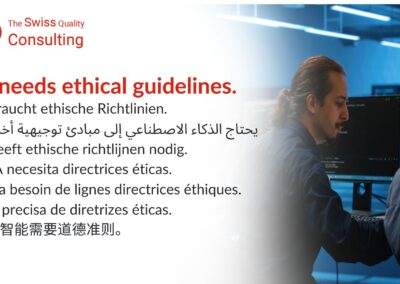Ensuring Responsible AI Development and Applications
The Importance of Ethical Guidelines in AI Development in Saudi Arabia and the UAE
The application of ethical guidelines in AI development is crucial for navigating the ethical dilemmas and trade-offs associated with AI applications. In rapidly advancing regions like Saudi Arabia and the UAE, where technology adoption is accelerating, ensuring that AI technologies are developed and used responsibly is paramount. These guidelines help balance innovation with ethical considerations, promoting public trust and long-term business success.
Saudi Arabia’s Vision 2030 initiative emphasizes the importance of leveraging modern technology to drive economic and social progress. As AI becomes increasingly integrated into various sectors, the need for ethical guidelines becomes more pronounced. These guidelines ensure that AI applications are developed in a way that respects privacy, avoids bias, and promotes fairness. By adhering to ethical standards, Saudi Arabian businesses can build AI systems that are not only effective but also trustworthy and aligned with societal values.
In the UAE, particularly in Dubai, the focus on technological innovation is matched by a commitment to ethical governance. The Smart Dubai initiative aims to harness the power of AI and other advanced technologies to improve public services and enhance quality of life. However, this vision must be underpinned by robust ethical guidelines that address the potential risks and dilemmas associated with AI. By implementing such guidelines, Dubai can ensure that its AI-driven initiatives are both innovative and ethically sound, fostering an environment where technology serves the greater good.
Addressing Ethical Dilemmas in AI Applications
AI applications have the potential to transform various industries, from healthcare and finance to transportation and education. However, the rapid deployment of AI technologies also raises significant ethical dilemmas. Issues such as data privacy, algorithmic bias, and the transparency of AI decisions are central to the ethical debate. Implementing ethical guidelines helps address these challenges, ensuring that AI systems are designed and deployed responsibly.
In Saudi Arabia, the government and private sector are working together to develop ethical frameworks for AI. These frameworks are designed to ensure that AI applications respect user privacy and are free from bias. For example, AI systems used in healthcare must comply with strict data protection regulations, ensuring that patient information is handled securely and ethically. Similarly, AI algorithms used in finance must be transparent and fair, preventing discriminatory practices and promoting equitable outcomes.
The UAE has also made significant strides in addressing the ethical challenges of AI. The establishment of the UAE Council for Artificial Intelligence and Digital Transformation highlights the country’s commitment to responsible AI development. This council works to develop ethical guidelines that ensure AI applications are transparent, accountable, and aligned with societal values. By fostering a culture of ethical AI, the UAE is setting a benchmark for other nations to follow, demonstrating that technological advancement and ethical responsibility can go hand in hand.
The Role of Blockchain and The Metaverse in Ethical AI Development
Blockchain technology and the Metaverse offer unique opportunities for enhancing the ethical development and application of AI. Blockchain’s decentralized nature provides a secure and transparent framework for managing data, ensuring that AI systems operate with integrity and accountability. The Metaverse, as an immersive digital environment, offers a platform for developing and testing AI applications in a controlled and ethical manner.
In Dubai, Blockchain is being used to enhance the transparency and security of AI systems. By recording AI decisions and data transactions on a blockchain, businesses can ensure that their AI applications are auditable and tamper-proof. This transparency is crucial for building public trust and ensuring that AI systems are used ethically. Moreover, Blockchain can help prevent data breaches and unauthorized access, protecting user privacy and promoting responsible data management.
The Metaverse, on the other hand, offers a virtual space for developing and testing AI applications. In Saudi Arabia, businesses and research institutions are exploring the potential of the Metaverse to create ethical AI systems. By simulating real-world scenarios in the Metaverse, developers can test the performance and ethical implications of their AI applications before deployment. This approach helps identify potential ethical issues early on, allowing for adjustments and improvements to be made in a controlled environment.
Executive Coaching and Leadership in Ethical AI Development
Executive coaching and leadership development are crucial for guiding businesses through the ethical challenges of AI development. In regions like Saudi Arabia and the UAE, where technological innovation is a key driver of economic growth, leaders must be equipped with the skills and knowledge to navigate the ethical dilemmas associated with AI. Implementing ethical guidelines in executive coaching programs ensures that leaders are prepared to make informed and responsible decisions, promoting sustainable business practices and long-term success.
In Saudi Arabia, executive coaching services are increasingly incorporating ethical AI considerations into their training programs. By emphasizing the importance of ethical guidelines, these programs help leaders understand the broader implications of AI development and develop strategies that align with ethical standards. This approach not only enhances the effectiveness of AI initiatives but also builds a culture of trust and accountability within organizations.
Similarly, in the UAE, leadership development programs are focusing on the ethical implications of AI and other advanced technologies. By integrating ethical guidelines into their curriculum, these programs prepare leaders to address the challenges and opportunities presented by AI. This training ensures that leaders can guide their organizations through the complexities of AI development, driving business success while upholding ethical standards.
Conclusion
The application of ethical guidelines in AI development is essential for navigating the ethical dilemmas and trade-offs associated with AI applications. In regions like Saudi Arabia and the UAE, where technological innovation is rapidly advancing, implementing ethical guidelines is crucial for sustainable and responsible growth. By integrating ethical considerations into the development and deployment of AI, these nations can mitigate risks, enhance public trust, and drive long-term business success.
Executive coaching and leadership development programs play a vital role in preparing leaders to navigate these challenges, ensuring that AI development efforts align with ethical standards and promote sustainable growth. The continued focus on ethical guidelines in AI development will be crucial as Saudi Arabia and the UAE continue to innovate and lead in the global technological landscape. By prioritizing ethical considerations, these regions can create a more inclusive and sustainable future, leveraging the full potential of AI to benefit society as a whole.
#ethicalAI #AIdevelopment #ethicaldilemmas #AIapplications #businesssuccess #SaudiArabia #UAE #Riyadh #Dubai #ArtificialIntelligence #Blockchain #TheMetaverse #executivecoaching #GenerativeAI #leadershipskills #managementskills #projectmanagement























